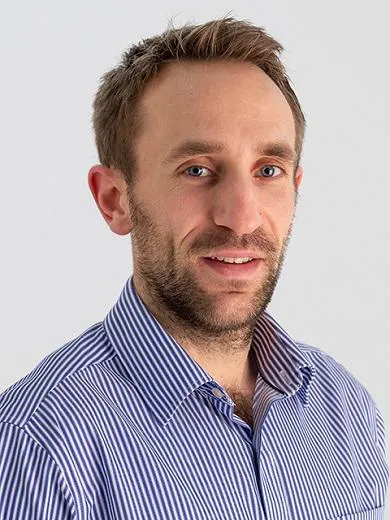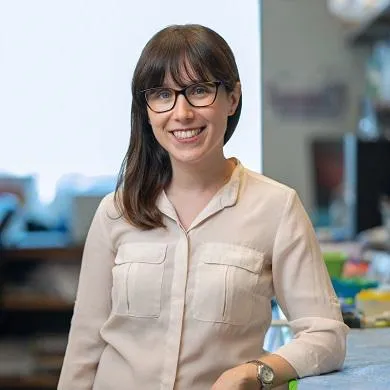UKRI’s Future Leaders Fellowships provide researchers and innovators with long-term support and training, giving them the freedom to explore adventurous new ideas, and to build dynamic careers that break down the boundaries between sectors and disciplines. The fellows announced today illustrate how this scheme empowers talented researchers and innovators to build the diverse and connected research and innovation system we need to shorten the distance between discovery and prosperity across the UK.
Professor Dame Ottoline Leyser, UKRI Chief Executive
04 December 2023
Future research leaders from King's receive prestigious UKRI fellowships
Three academics from King’s have been recognised as some of the UK's most promising researchers in science, having each been named a recipient of the coveted Future Leaders Fellowship, awarded by UK Research and Innovation (UKRI).

Announced today, King’s Dr Tom Matthews, Dr Antonio Forte and Dr Cinzia Imberti will each benefit from UKRI's highly competitive and flagship programme, which is designed to support scientists to tackle major global challenges, while supporting them as they become the next generation of research leaders.
Heralding from the Faculty of Social Science & Public Policy (SSPP), Faculty of Natural, Mathematic & Engineering Sciences (NMES) and Faculty of Life Sciences & Medicine (FoLSM) respectively, the three newly appointed fellows are among 75 recipients who will benefit from £101 million in UKRI funding.
Dr Tom Matthews, Senior Lecturer in Environmental Geography (SSPP)

Dr Tom Matthew's research focuses on environments and events that are meteorologically extreme.
Climate change is now widely regarded as an existential threat. But what could be the pathway to catastrophe? Global risk surveys routinely find the greatest concerns about extreme weather, yet the most severe extremes – with perhaps catastrophic potential – remain poorly understood. This stems from an understanding of severe, known threats that is too shallow, and a lack of breadth in anticipating hazards that may lack any precedent.
Dr Matthews will use the Future Leaders Fellowship to address the former by targeting the threat from heat beyond human tolerance in South Asia; it tackles the latter by developing a framework to search for the most threatening ‘unseen’ extremes.
He said: "Climate change is pushing us into territory that is new to humankind. Extreme events are in the vanguard of this charge into the unknown, and they threaten catastrophic impacts if society is caught by surprise. This Fellowship will work to reduce this risk by illuminating the most significant dangers from such "unseen" climate extremes.
“It is the most pressing research agenda I can imagine in my field. I am excited to pursue it at King's."
Dr Antonio Forte, Lecturer in Engineering and Head of the Reconfigurable and Adaptive Designs Lab (NMES)

Dr Antonio Forte will explore how engineered, shape-changing materials can challenge the way we design, perceive, and control matter. The project will also help remove barriers for people with mobility impairments, in addition to having applications across robotics.
Common conditions such as stroke, chronic fatigue syndrome and multiple sclerosis have led many to experience loss of control or strength in their muscles, impacting everyday movement and quality of life. While traditional ‘hard’ robotics approaches, such as supporting exoskeletons, have been effective at tackling the problem, these systems are often expensive, bulky, and heavy. Additionally, the metallic parts, cables and motors which accompany these robots are difficult to seamlessly integrate into garments, impacting the level of control individuals feel about the visibility of their disability.
By developing a soft mechanical metamaterial that can change shape dependent on the will of the wearer, the project hopes to develop safe and reconfigurable wearable devices that patients can use as an aid to everyday movement. Contained within each device will be a series of pressurised chambers, which will either inflate or deflate to change the overall shape of the wearable enabling it to support muscles when they’re used — such as when lifting an object or reaching for a shelf. The optimum pattern for inflation and deflation to fulfil specific functions will be controlled using artificial intelligence (AI), with the goal of the technology to interface with users’ brain and their muscles’ electrical signals to be able to shape dependent on their intention.
Dr Forte said: “The award of a Future Leader Fellowship is a great honour. It also reinforces the importance of our research agenda, which will help us sustain the outstanding UK research in the fields of metamaterials, robotics, and AI. My team and I are on a mission to challenge the ideas of materials as inanimate matter and create materials that we can control the shape and function of. In other words, the aim here is to create the first generation of robotic matter that can interact with human hosts.”
The next four years of the project will focus on manufacturing the devices, modelling their mechanics and training AI models to achieve optimal shape-morphing dependent on need, followed by three years exploring how neuroscience can lead to the devices interfacing with the brain. Throughout its lifetime NARMM will involve academic and industrial partners across Europe and the U.S, including collaborators at Harvard, MIT, and robotics firm HaptX.
Dr Cinzia Imberti, Research Affiliate in Imaging Chemistry & Biology (FoLSM)

Whether essential for life or key components of medicines, metal ions’ importance in human health and disease is enormous. However, the biology of metals is largely unexplored, as their chemistry is complex and their low concentration in biological system makes them difficult to study.
Dr Imberti's research will combine the most recent advances in imaging technologies into a unique imaging toolbox to visualise metal behaviour in cancer at a cellular, tissue and whole-body level.
As part of her UKRI Fellowship, Dr Imberti will study how and why ovarian cancer eventually stops responding to platinum drugs, the most important chemotherapeutic treatment for ovarian cancer patients.
She will investigate the link between platinum drugs resistance and reduced platinum accumulation in ovarian cancer, and how this could be connected to trafficking of the essential metal copper. She will explore whether removing copper, thus making the tumour more 'hungry' for this essential nutrient, will also trick it into taking up more platinum drugs, potentially reversing platinum resistance. To observe these processes while they are happening inside the body, Dr Imberti and her group will label both the platinum drugs and copper with a radioactive tag and track them inside a living organism in real-time images using a scanner.
This research will not only improve our understanding of platinum resistance but also enable the development of imaging-based tools to check if a patient's tumour is resistant to platinum drugs, so that the patient can be moved to different treatments earlier.
Dr Imberti said: "I am incredibly delighted to be awarded this fellowship that will allow me to establish my research programme at KCL, in the emerging field of Imaging Metallomics. I am excited to develop an innovative imaging toolbox to address urgent questions in Metallomics, particularly around the role of metals in cancer progression and treatment, and to collaborate with clinicians to translate the resulting new science into real impact for patients."
Future Leaders Fellowships support talented people in universities, businesses, and other research and innovation environments.


